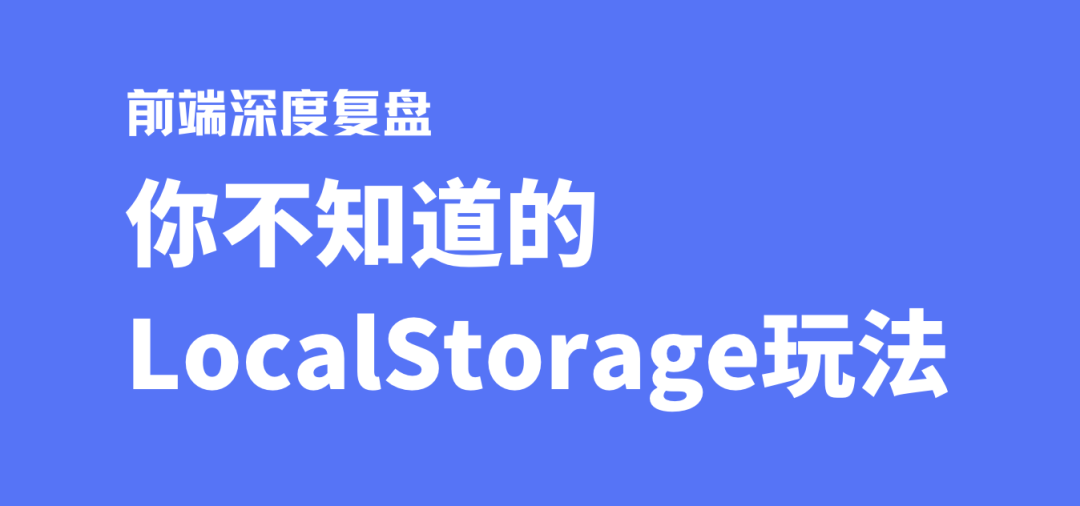面试官: 如何让localStorage支持过期时间设置?
聊到 localStorage 想必熟悉前端的朋友都不会陌生, 我们可以使用它提供的 getItem, setItem, removeItem, clear 这几个 API 轻松的对存储在浏览器本地的数据进行读,写, 删操作, 但是相比于 cookie, localStorage 唯一美中不足的就是不能设置每一个键的过期时间。
localStorage 属性允许我们访问一个 Document 源(origin)的对象 Storage;存储的数据将保存在浏览器会话中。localStorage 类似 sessionStorage,但其区别在于:存储在 localStorage 的数据可以长期保留;而当页面会话结束——也就是说,当页面被关闭时,存储在 sessionStorage 的数据会被清除 。
我们还应注意,localStorage 中的键值对总是以字符串的形式存储。
问题描述
在实际的应用场景中, 我们往往需要让 localStorage 设置的某个 key 能在指定时间内自动失效, 所以基于这种场景, 我们如何去解决呢?
1. 初级解法
对于刚熟悉前端的朋友, 可能会立马给出答案:
localStorage.setItem('dooring', '1.0.0')
// 设置一小时的有效期
const expire = 1000 * 60 * 60;
setTimeout(() => {
localStorage.setItem('dooring', '')
}, expire)当然这种方案能解决一时的问题, 但是如果要设置任意键的有效期, 使用这种方案就需要编写多个定时器, 维护成本极高, 且不利于工程化复用。
2. 中级解法
前端工程师在有一定的工作经验之后, 往往会去考虑工程化和复用性的问题, 并对数据结构有了一定的了解, 所以可能会有接下来的解法:
- 用localStorage存一份{key(键): expire(过期时间)}的映射表
- 重写localStorage API, 对方法进行二次封装
类似的代码如下:
const store = {
// 存储过期时间映射
setExpireMap: (key, expire) => {
const expireMap = localStorage.getItem('EXPIRE_MAP') || "{}"
localStorage.setItem(
'EXPIRE_MAP',
JSON.stringify({
...JSON.parse(expireMap),
key: expire
}))
},
setItem: (key, value, expire) => {
store.setExpireMap(key, expire)
localStorage.setItem(key, value)
},
getItem: (key) => {
// 在取值之前先判断是否过期
const expireMap = JSON.parse(
localStorage.getItem('EXPIRE_MAP') || "{}"
)
if(expireMap[key] && expireMap[key] < Date.now()) {
return localStorage.getItem(key)
}else {
localStorage.removeItem(key)
return null
}
}
// ...
}眨眼一看这个方案确实解决了复用性的问题, 并且不同团队都可以使用这个方案, 但仍然有一些缺点:
- 对
store操作时需要维护2份数据, 并且占用缓存空间 - 如果
EXPIRE_MAP误删除将会导致所有过期时间失效 - 对操作过程缺少更灵活的控制(比如操作状态, 操作回调等)

3. 高级解法
为了减少维护成本和空间占用, 并支持一定的灵活控制和容错能力, 我们又应该怎么做呢?
这里笔者想到了两种类似的方案:
- 将过期时间存到
key中, 如 dooring|6000, 每次取值时通过分隔符“|”来将key和expire取出, 进行判断 - 将过期时间存到
value中, 如 1.0.0|6000, 剩下的同1
为了更具有封装性和可靠性, 我们还可以配置不同状态下的回调, 简单实现如下:
const store = {
preId: 'xi-',
timeSign: '|-door-|',
status: {
SUCCESS: 0,
FAILURE: 1,
OVERFLOW: 2,
TIMEOUT: 3,
},
storage: localStorage || window.localStorage,
getKey: function (key: string) {
return this.preId + key;
},
set: function (
key: string,
value: string | number,
time?: Date & number,
cb?: (status: number, key: string, value: string | number) => void,
) {
let _status = this.status.SUCCESS,
_key = this.getKey(key),
_time;
// 设置失效时间,未设置时间默认为一个月
try {
_time = time
? new Date(time).getTime() || time.getTime()
: new Date().getTime() + 1000 * 60 * 60 * 24 * 31;
} catch (e) {
_time = new Date().getTime() + 1000 * 60 * 60 * 24 * 31;
}
try {
this.storage.setItem(_key, _time + this.timeSign + value);
} catch (e) {
_status = this.status.OVERFLOW;
}
cb && cb.call(this, _status, _key, value);
},
get: function (
key: string,
cb?: (status: number, value: string | number | null) => void,
) {
let status = this.status.SUCCESS,
_key = this.getKey(key),
value = null,
timeSignLen = this.timeSign.length,
that = this,
index,
time,
result;
try {
value = that.storage.getItem(_key);
} catch (e) {
result = {
status: that.status.FAILURE,
value: null,
};
cb && cb.call(this, result.status, result.value);
return result;
}
if (value) {
index = value.indexOf(that.timeSign);
time = +value.slice(0, index);
if (time > new Date().getTime() || time == 0) {
value = value.slice(index + timeSignLen);
} else {
(value = null), (status = that.status.TIMEOUT);
that.remove(_key);
}
} else {
status = that.status.FAILURE;
}
result = {
status: status,
value: value,
};
cb && cb.call(this, result.status, result.value);
return result;
},
// ...
};
export default store;这样, 我们就实现了每个 key 都有独立的过期时间, 并且对不同的操作结果可以轻松的进行状态管控啦~
4. 骨灰级解法
当然, 骨灰级解法是直接使用 xijs 这个 javascript 工具库, 因为我已经将上述完整实现方案封装到该库中了, 我们只需要使用如下的方案, 就能轻松使用具有过期时间的强大的 localStorage 方法啦 :
// 先安装 yarn add xijs
import { store } from 'xijs';
// 设置带有过期时间的key
store.set('name', 'dooring', Date.now() + 1000);
console.log(store.get('name'));
setTimeout(() => {
console.log(store.get('name'));
}, 1000);
// 设置成功后的回调
store.set('dooring', 'xuxiaoxi', Date.now() + 1000, (status, key, value) => {
console.log('success');
});
同时 xijs 还在持续扩充更有用的工具函数, 让业务开发更高效. 目前已集成了如下工具函数:
- store 基于
localStorage上层封装的支持过期时间设置的缓存库, 支持操作回调 - uuid 生成唯一id, 支持设置长度
- randomStr 生成指定个数的随机字符串
- formatDate 开箱即用的时间格式化工具
- debounce 防抖函数
- throttle 节流函数
- url2obj 将url字符串转换为对象
- obj2url 将对象转换成编码后的url字符串
- isPC 判断设备是否为PC类型
github地址: https://github.com/MrXujiang/xijs
文档地址: http://h5.dooring.cn/xijs/lib/store
